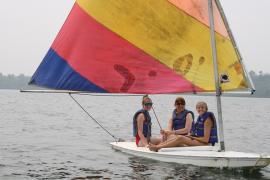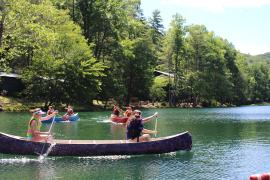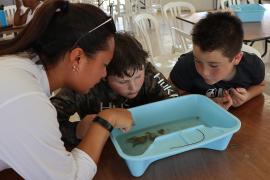As I continue to ponder the conundrum of staffing challenges that are ever present today, I am equally amazed by the level of commitment that many young people have to camp — particularly those who have a multitude of noble options pulling them in different directions than spending a summer working with kids. Instead, they happily and eagerly choose camp, often at very pivotal points along their career journey. The path leading to camp for these dedicated staff may be different, but the outcome is the same. Some of the very best young adults are giving of themselves to forever impact the future of those they serve.
Meet Alex, a recent graduate of Northwestern University in political science and Spanish. Alex spent the summer prior to starting law school at the University of Virginia at her childhood camp in Wisconsin. Alex traveled the familiar course of camper, to CIT, to junior counselor, to counselor before spending two summers doing legal internships with the Department of Homeland Security and the State Attorney’s Office in Cook County (Chicago). Her days were filled with copying, organizing files, running errands, working on briefs, and doing research.
So, why camp before embarking on a professional track? Alex knows that three years of law school will be grueling, so she chose to return to camp to “reset” after a stressful senior year. Alex wanted to get back to her core values and roots and focus on her own mental health and well-being. Camp fosters cultural sensitivity and empathy because there is always a bigger picture and context. Camp pushes Alex to learn in a non-traditional way.
Camp has taught Alex that people come from different backgrounds and perspectives and the importance of meeting them where they are. It would be easy to show intolerance for challenging campers; however, she recognizes the importance of understanding why they react they way they do. Alex developed important communication skills and gained the ability to accommodate different learning styles and levels during swimming instruction. Being exposed to native Spanish speakers from Mexico at camp, Alex is adept at more than just the language; rather, she has an understanding of the culture. Having experienced geographical diversity at camp may lead Alex to pursue her dream to practice international law outside of the US.
Meet Patrick, a rising junior at the Citadel majoring in criminal justice. Patrick is also returning to the camp where he spent several years as a kid. He wants to do something different and get the most out of his summer. Due to the many demands of school and playing a college sport, Patrick is looking forward to no class, workouts, or practice. He recognizes that he will gain experience in leadership, group coordination, and responsibility by being a cabin counselor and in charge of the football program and outdoor survival class. Spending a summer working at camp is a way to give back and is so much more fun than being stuck in an office!
Patrick plans on being the first one in the mud pit this summer and teaching kids “tricks” for being out in the woods. When looking back at his own North Carolina camp experience, Patrick was fishing in every picture. He knows that times have changed and that some kids will have difficulty disconnecting from technology for several weeks. He wants them to get the full experience that he had and enjoy living in the moment. Patrick has set the goal for all campers in his cabin to be real friends and bond; he knows that he is a huge part of that. Living with others, adapting to being away from home, and treating people with respect are some of the lessons Patrick remembers from his time at camp, and he wants to be the one to pass on those same life lessons.
Meet Sarah, a recent biochemistry graduate from Millsaps College. Sarah always wanted to go to camp and would have been the kid who stayed for the longest session every summer had year-round soccer not competed for her out-of-school time. She loves being in nature, hiking, and is game for just about any adventure. Sarah is a first-year staff member at an overnight camp in the mountains and is excited to finally get a chance to experience camp before beginning medical school at LSU this fall.
Sarah’s ultimate goal is to become a pediatric surgeon, and she knows that she has a good 10–12 years of training ahead of her. Camp offers a chance for Sarah to flex different leadership muscles and provides an opportunity for her to grow in ways outside of academics and athletics. Working with kids at camp will afford Sarah invaluable experience caring for and fostering compassion for other people’s children, her potential patient population.
While finding and keeping quality staff is definitely more challenging than it once was, it is important to celebrate the incredible people who are committed to doing an amazing job every single day. Who are the rock stars at your camp that are making a tremendous impact this summer? Different roads may have led them all to camp, but camp is a much better place because they came.
This blog was written in support of ACA’s Task Force, Project Real Job. Project Real Job was created to examine issues related to summer camp employment and support efforts to recruit, hire, and retain summer staff and position summer camp employment as a valuable careerreadiness experience. You can find resources to use to make a case with parents, professors, and other stakeholders involved in your decision to work at camp.
Kim Aycock, MST, has more than 30 years of experience blending the skills of a master teacher with the knowledge of a seasoned camp expert. She trains camp staff at all levels, speaks professionally at regional and national conferences, and is co-leader of ACA’s Task Force, Project Real Job. More information can be found on her website: kimaycock.com. Kim may be contacted at [email protected].
Photo courtesy of Wohelo Camps in in Raymond, ME
The views and opinions expressed by contributors are their own and do not necessarily reflect the views of the American Camp Association or ACA employees.




